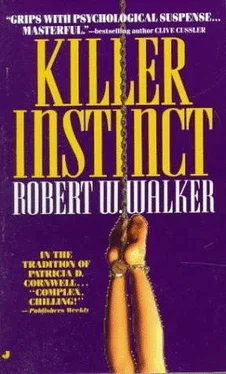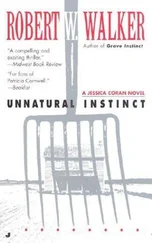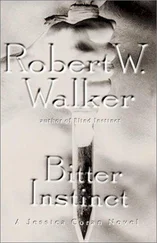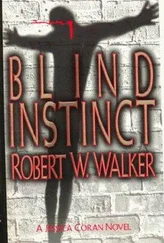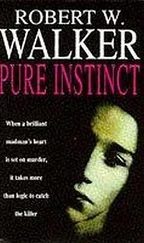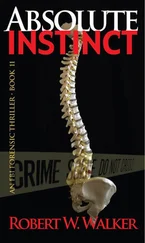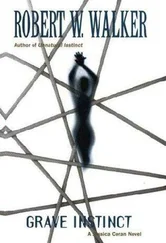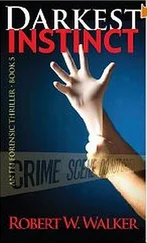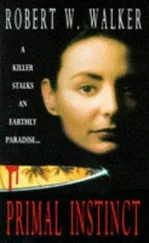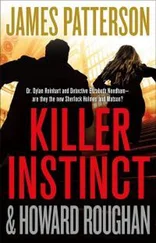Robert Walker - Killer Instinct
Здесь есть возможность читать онлайн «Robert Walker - Killer Instinct» весь текст электронной книги совершенно бесплатно (целиком полную версию без сокращений). В некоторых случаях можно слушать аудио, скачать через торрент в формате fb2 и присутствует краткое содержание. Жанр: Полицейский детектив, на английском языке. Описание произведения, (предисловие) а так же отзывы посетителей доступны на портале библиотеки ЛибКат.
- Название:Killer Instinct
- Автор:
- Жанр:
- Год:неизвестен
- ISBN:нет данных
- Рейтинг книги:3 / 5. Голосов: 1
-
Избранное:Добавить в избранное
- Отзывы:
-
Ваша оценка:
- 60
- 1
- 2
- 3
- 4
- 5
Killer Instinct: краткое содержание, описание и аннотация
Предлагаем к чтению аннотацию, описание, краткое содержание или предисловие (зависит от того, что написал сам автор книги «Killer Instinct»). Если вы не нашли необходимую информацию о книге — напишите в комментариях, мы постараемся отыскать её.
Killer Instinct — читать онлайн бесплатно полную книгу (весь текст) целиком
Ниже представлен текст книги, разбитый по страницам. Система сохранения места последней прочитанной страницы, позволяет с удобством читать онлайн бесплатно книгу «Killer Instinct», без необходимости каждый раз заново искать на чём Вы остановились. Поставьте закладку, и сможете в любой момент перейти на страницу, на которой закончили чтение.
Интервал:
Закладка:
There was some muffled laughter at this.
Schultz picked up the thread from here, clearing his throat first, his hand going habitually to his throat, as if protecting his own jugular as he spoke. “Many killers take something of the victim's away with them-a bracelet, a ring, a watch, a mirror or compact-as a kind of artifact of the crime; to use later to excite themselves, to relive the experience, recreate the memory. This guy took blood!”
O'Rourke added to this. “Certain kinds of killers also keep diaries, scrapbooks, other memorabilia of their deeds. With this guy, it's likely to be a freezer filled with blood in tidy packs or jars.”
“ Tidy,” said Jessica.
“ What?” asked Otto.
“ Oh, nothing… just that I had gotten the exact same impression of the killer when we were there, in Wekosha, that he was a fastidious man. You people are remarkable,” she said to them.
“ Trust me,” said O'Rourke, “we rely a great deal more on statistical probability than on our deep psychological insights.”
“ Ah-ahhh, Teresa,” said Byrnes with a shake of his index finger, “we're not to give away trade secrets.”
“ Plain common sense; experience gained from sweating out hundreds of cases,” said Schultz. “With the Copeland case, for instance, since the victim was white, it's a good, educated guess that her killer, too, is white. But then you connected Janel McDonell to the killer, and she was black. Most black women are killed by blacks, and whites by whites,” said Byrnes.
“ This is especially true in the vast majority of mutilation murders,” said Otto.
“ We settled on white, because Trent was white. Two out of three,” said Schultz.
“ And the age?” Jessica asked.
O'Rourke replied. “The kind of methodical, organized killer he is points to someone who's been around a while. He's probably fantasized about these crimes for twenty years, since puberty.”
“ The killer's conduct with regard to the victim both before and after death,” added Bymes a bit smugly, “was quite measured, quite controlled, and this would be highly unusual in an impulsive teenager or someone in his early twenties.”
“ He lives alone, or if with someone else it will be an elderly parent who is dependent upon him.”
“ How can you possibly know that?” asked Jessica, who had remained silent, completely fascinated by the work of the profiling team.
O'Rourke half turned in her chair and crossed her shapely legs before saying, “It's virtually certain he can't carry on a lasting relationship with a woman, and if he has sustained one, it will be to a wife who is totally dominated by him, a virtual house slave. But more likely, he's a momma's boy, and is either taking care of his mother or living in her house left him when she died. This is, of course, in all probabil-ity.”
' 'The guy did know a lot about Wekosha. He has spent a lot of time there,” said Schultz.
“ And Iowa City, and Paris, Illinois,” added Bymes.
“ Because he knew where to take his victims. He knew how much time he had with each. “He had to be fairly familiar with his surroundings to chance this kind of killing. He's no fool, no impulsive kid on a rampage.”
“ So he lives near the crime scene for a while?” asked Jessica. “People in the area had to have had dealings with him, then.”
“ All that's certain is that he knew the area well enough that he felt he could do whatever he wanted to do without disturbance,” finished Otto. “But the distances between these cases suggests a moving killer, someone who may be familiar to people in Wekosha, but someone who does not stay very long, a kind of recurring, cyclical person.”
“ Like a deliveryman?”
“ A trucker? Maybe a long-haul man?”
“ Or a salesman,” suggested O'Rourke.
“ Hospitals on the one hand, salesmen on the other.”
“ Salespeople frequent hospitals every day,” said Jessica.
“ By the hundreds of thousands,” said J.T.
Otto paced. Everyone watched him. He had an uncanny ability to come up with detailed descriptions of unknown assailants on the scantiest of information. His mind seemed to be boiling over with these new suggestions. Everyone remained silent, watching him.
Boutine began his profiling career in 1979, and at the time he taught a course in applied criminology at the FBI Academy, where students who came from all over the country brought him their cases. One story had it that when one of his former students telephoned from Oregon with a baffling case, Otto, with a handful of details about the stabbing death of a young woman, told his student he should be looking for a teenager who lived near the victim. Otto said he would be a skinny, pimply boy who spent more time with computers than people, a socially isolated individual. He said it was an impulsive act and the kid was suffering from great fear, grief and remorse, and that his guilt would give him away. “If you walk the neighborhood, knock on doors, you'll probably run into him, and when you identify yourself, just stare straight into his eyes and say, 'You know why I'm here.'“ The next day the Oregon officer called back to thank Otto and to say that he had apprehended the killer, a teenager with acne whose best friend was his Tandy 2000.
Otto had made it clear that he wasn't interested in psychology for psychology's sake, that a treatise on mental disorders was of no use to the FBI, that his interest was not in why a killer did what he did, but how he did it, and how knowing that leads to his capture.
“ A profile,” he said now, “is supposed to point to a certain general type of person, not a certain individual-or profession. If we're not careful here, folks, we could spend the next several months following up blind leads in hospital corridors looking for a guy who sells white linen or bedpans to hospitals. I'm not sure we can stretch our profiling to that degree, at least not yet.”
Without saying it, he was telling them something they all knew, that the FBI profile could be dead wrong.
“ Still, Chief, don't you think we should get people in Wekosha, you know, to sniff around? More than one killer's been caught putting flowers on the grave of his victim,” said Byrnes.
“ Sure… sure,” said Otto. “You want to coordinate with Milwaukee on that?”
“ Will do,” replied Byrnes.
“ I just keep remembering the Koontz case,” said Boutine.
There was a communal moan.
Otto went on. “We had the guy living alone, a possible orphan, uneducated, without a job or ties in the community, remember?”
Everyone remembered but Otto said it anyway. “He was the son of the town minister; had children and a wife and mother-in-law; was the town's most well liked, well known appliance store owner, which gave him an annual income of forty thousand plus a year. He taught Sunday school and played on the softball team, never touched a drop of alcohol and attended church regularly.” His crimes, in fact, were an “act” of faith. It was a reminder that profiling was far more art than science, despite probability statistics.
“ If we could pinpoint where he lived, go at this in a proactive sense,” began Schultz. “Put the press to work for us.”
Byrnes objected. “That could backfire. A guy that's this nuts could kill himself.”
“ Better him than another of his victims,” said O'Rourke coldly.
“ And so he's buried with what he knows, like how many others he killed,” finished Byrnes.
The proactive technique meant utilizing the press, feeding them information selectively, the end result to smoke out the killer, taunt him, and hope that he might be foolish enough to give something of himself away. It was a deadly kind of cat-and-mouse game, a bit like Russian roulette. “We can't use the press unless we know the guy's jumpy,” said Boutine. “So far, he seems quite cool.”
Читать дальшеИнтервал:
Закладка:
Похожие книги на «Killer Instinct»
Представляем Вашему вниманию похожие книги на «Killer Instinct» списком для выбора. Мы отобрали схожую по названию и смыслу литературу в надежде предоставить читателям больше вариантов отыскать новые, интересные, ещё непрочитанные произведения.
Обсуждение, отзывы о книге «Killer Instinct» и просто собственные мнения читателей. Оставьте ваши комментарии, напишите, что Вы думаете о произведении, его смысле или главных героях. Укажите что конкретно понравилось, а что нет, и почему Вы так считаете.
